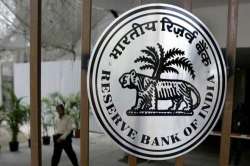RBI cuts repo rate by 25 basis points; reverse repo rate falls to 6.00 per cent
The inflation rate was estimated at 3.2-3.4 per cent in the first half of the year 2019-20 and 3.9 per cent in the third quarter of 2019-20.

The Reserve Bank of India (RBI) on Thursday cut repo rate by 25 basis points, now at 6.25 from 6.5 per cent, while the reverse repo rate stood at 6.00 per cent. The GDP growth for 2019-20 was put at 7.4 per cent by the bank. The inflation rate was estimated at 3.2-3.4 per cent in the first half of the year 2019-20 and 3.9 per cent in the third quarter of 2019-20.
While addressing the media, RBI Governor Shaktikanta Das said, "Headline inflation is expected to remain contained below or at its target of 4 per cent. This has opened space for policy action. Investment activity is recovering supported mainly by public spending on infrastructure."
"Export growth on a year-on-year basis was almost flat in November and December 2018, primarily due to a high base effect and weak global demand," he said.
The Reserve Bank of India also decided to enhance the collateral free agriculture loan from Rs 1 lakh to Rs 1.6 lakhs, which was taken of the overall rise in inflation, marginal agriculture input and benefit to small farmers.
According to news agency ANI, the RBI taken a positive view of a proposal for an umbrella organisation for urban cooperative banks.
In view of the surge in digital transactions, the Monetary Policy Committee of the Reserve Bank had decided to implement ombudsman for digital transactions.
After back-to-back hikes since June, the RBI had kept interest rates unchanged in the previous policy review in October last year, surprising markets that had expected a rate hike to support the tumbling rupee and combat inflationary pressures from high oil prices.
India's economic growth slowed to 7.1 per cent in the September quarter after peaking to an over two-year high in the first three months of this fiscal, as consumption demand moderated and farm sector displayed signs of weakness.
The growth in Gross Domestic Product (GDP) in July-September was the lowest in three quarters, but better than 6.3 per cent in the same period of the previous year.
The Indian economy had grown by 8.2 per cent in the first quarter of the current fiscal year that began in April last year, according to data released by the Central Statistics Office (CSO).
Kotak Research said the MPC in its last policy had estimated inflation at 3.9-4.5 per cent in the second half of the fiscal and 4.8 per cent in first quarter of next year.
It expects the inflation at 2.9-4.3 per cent in the second half of the fiscal and 4.5 per cent in first quarter of 2019-20.
While softer retail fuel prices will push core inflation lower, there will be significant divergence from headline inflation mainly on the back of higher prices of education and health," Kotak Research said, adding that it expects RBI to maintain status-quo.
Devendra Kumar Pant, Chief Economist, India Ratings and Research (Fitch Group), said 2018-19 may still end up with a GDP growth of 7.3 per cent and "RBI may get the much needed elbow room to keep the policy rate unchanged in the forthcoming bi monthly policy review on 5 December 2018".
Retail inflation based on Consumer Price Index (CPI) fell to a one-year low of 3.31 per cent in October on the back of cheaper kitchen staples, fruits and protein-rich items, as per latest available data.
It was 3.7 per cent in September 2018 and 3.58 per cent in October 2017. The retail inflation number is the lowest since September 2017, when it touched 3.28 per cent.